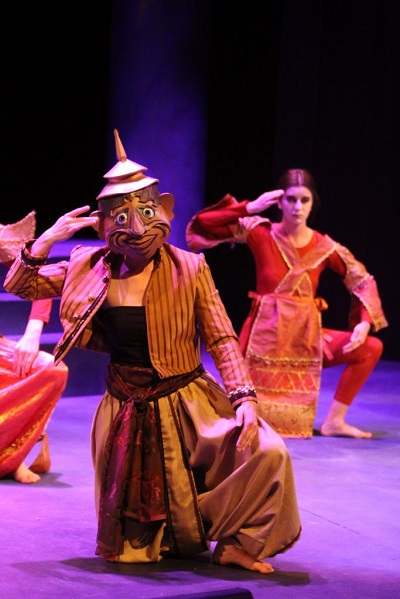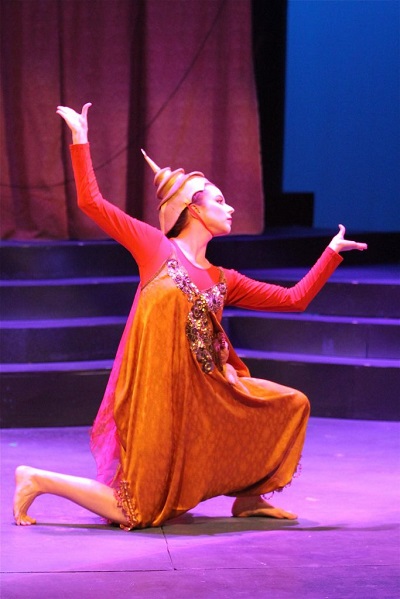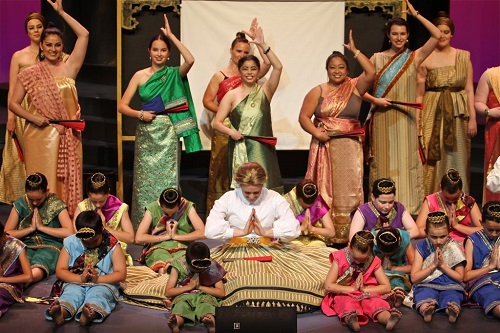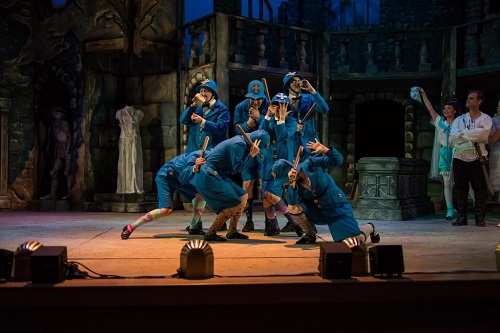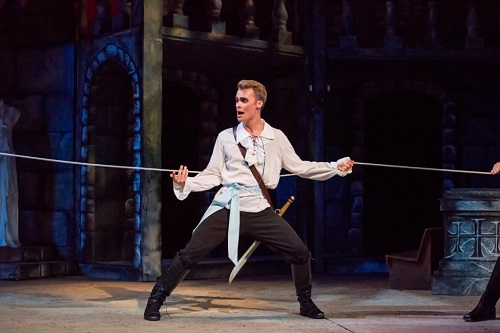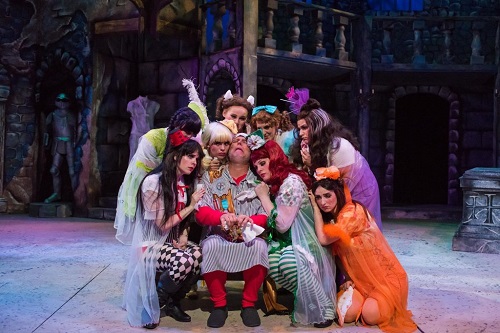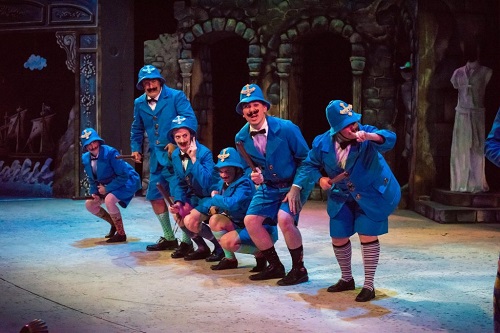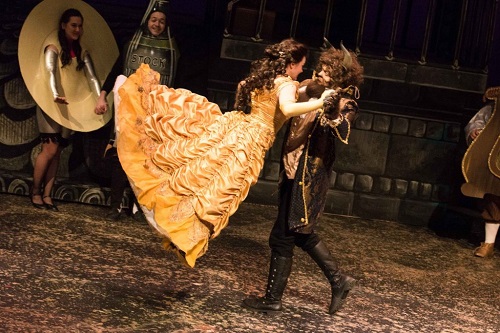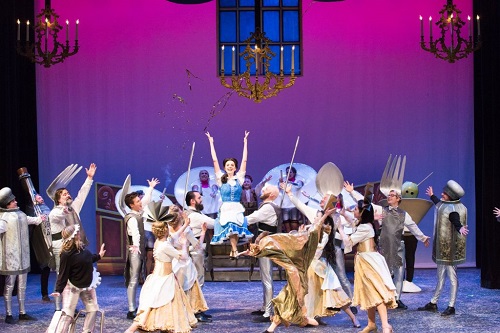One Choreographer’s Most Frequently Given Notes
My current project, “All Shook Up,” opens at the end of the month. As choreographer for this jukebox musical, I’ve created, taught and am currently polishing 24 musical numbers, all Elvis hits. I enjoy choreographing musical theatre pieces for local, community theatre companies. I particularly love creating movement that forwards plot, reveals character, has conceptual meaning, looks interesting and increases the cast’s abilities in dance, movement and acting. I don’t always get all those things accomplished in every sequence, but that’s what I’m aiming for. And it seems, regardless of the piece, the cast, the rehearsal process, or the choreography I’ve generated, I end up giving roughly the same types of notes to each cast at similar points in the process.
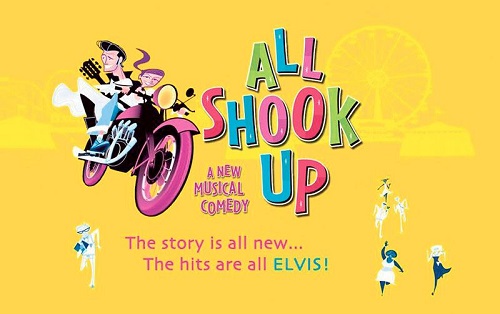
Early Rehearsals
Drink lots of Water
This can sound ridiculous to you, but I can’t stress enough that you can’t rehearse well if you feel ill. I’m going to work you as hard as I can for the time allotted. You’re going to sweat. Drink lots of water before and during rehearsal.
Eat Your Wheaties
This is my shorthand way of saying “eat healthy and make sure you’ve got the caloric intake to support the caloric burning that is going to happen for three solid hours at the end of your day.” Not every rehearsal will tax you completely, but at least some will. Look at your schedule, and don’t skip dinner. Your body can’t perform without proper fuel.
Be Memorized When You Arrive
Nothing hinders a choreography rehearsal so unnecessarily as a dancer not knowing the music. Yes, I know, we dance to counts. But this is musical theatre and words are important touchstones. Whether you are singing the lyrics or not, I expect you to know the music before you try to put dance to it. Even if the movement isn’t complicated, I’m going to ask for it to be precise and you can’t do that if you don’t know where you are in the number. And if you do sing…know your part cold. I’m not going to choreograph you next to other Tenors just to help you find your part. Please don’t use the repetition of a choreography rehearsal as the place where you’ll finally learn your music. Use it to learn the dance.
Mid Rehearsals
Review and Repeat
There are not going to be enough repetitions in rehearsals for you to get everything down in muscle memory, and muscle memory is where this choreography should be. Practice outside of rehearsal. Even if your brain latches on, give your muscles the benefit of regular, consistent practice. Your extension will improve, your strength will improve, your form will improve. And then we won’t waste time in the next phase of rehearsals which is really all about…
Tech and Dress
Mindfulness and Awareness
Now dance with changing lights! Now dance in the performance space which may not be the same as the rehearsal space in flooring or proportions! Now dance with performance tracks which may sound different from the rehearsal tracks, or with an orchestra which sounds different than the rehearsal pianist! Now dance in different shoes and wearing different clothes! Now dance holding the thing you only pantomimed holding earlier! So much gets thrown at an actor during this phase. The best way to not lose ground is to focus on doing what you’ve rehearsed. However, I’ve found that telling a cast to “Focus!” isn’t as helpful as it ought to be. So let me tell you about something I learned in a University of Utah Eastern Theatre class–mindfulness and awareness.
At the beginning of every Eastern Theatre class, we meditated. Eastern theatre traditions grew out of religious traditions in forms and purpose and the meditations we practiced helped us to understand and execute the theatrical forms. We were taught and practiced mindfulness and awareness. Awareness was about the present moment. As we meditated, we would hear, but we would not listen. If a sound was made, it passed through the consciousness, but the consciousness didn’t cling to it. Aware, but not distracted. Mindfulness was about the moment to come. Again, not distracted, and not aware either since the moment to come has not yet arrived, simply mindful that it will arrive.
In choreography there is the move and the sequence. A dancer may be able to execute a great many moves in isolation, but that does not take care of knowing the combination or the routine. If a dancer waits to think about the move until it is time to execute it, the move will be late. If a dancer focuses too much on the move to come, the current move will be compromised, either hastily, sloppily or half-heartedly committed. If a dancer stumbles, he or she cannot cling mentally to the mistake or the whole coming sequence will likewise be compromised. Focus on the move that is now, prepared for the moves to come. Aware and mindful dancing.
A Few Final Words About Performances
Little variables will be different every night that will effect your performance. The cleanliness of the floor, the wearing down of your shoes, what you ate that day, how much you slept, how well you warmed up and stretched and more. Some of those variables are under your control and you should do your best before you get to the theatre to set yourself up for an excellent performance. As for the ones out of your control? see the notes above on mindful and aware.
Ignore
But there is one variable that some of you may just need to ignore–the audience. If you find yourself performing for a sparse and/or quiet audience, and you don’t have the craft, technique or the gas to up your performance accordingly, please for the love of art and dancing, don’t play down! Don’t phone it in! Don’t just go through the motions as efficiently as possible assuming that you all just want to get out of there tonight! If a quiet or small audience doesn’t elicit a “better than your previous best” effort, then don’t be aware of the audience. If a variable you can’t control doesn’t help you, don’t relinquish your performance to it by attending to it.
Too Smooth and Too Polished
We talk about cleaning and polishing the choreography, but something that often happens in musical theatre ensembles who perform for a lengthy run is getting too smooth, or too polished. What I think is happening here is that efficiency takes over. Our brains are wired to find faster and easier ways of performing habitual tasks, but that is no good for choreography in one important way. When I come back to watch a show that I felt great about on opening night, sometimes what I see is a boring efficiency in the choreography. Some of the raw energy is gone. Some of the full extension and individual articulation of joints and muscles have left. Some of the dynamic pacing and rhythm of the performance has been smoothed out. Micro-beats of hesitation and anticipation that make the movement full and rich when internally motivated by, ya know, the acting stuff, are just gone. Muscle memory has taken over and is wholly relied upon. The choreography is accurate, casually, efficiently and boringly accurate. That’s not what any of us are here for, so, don’t let that happen to you. Stay in the game.
Dance Like Everyone is Watching
Because they are! They are watching you the whole time. Yes, you! Ensemble #4 in the back. And here’s how I know it. The audience takes in much more of the stage with their peripheral vision than they are even aware of. If you match your fellow cast mates in timing, form and energy, the picture is cohesive and the audience can tell without looking directly at you. If you outshine your cast mates in energy and out perform them in technique, the peripheral attention you are receiving will be snatched up and you will have their focused attention. “Stole the show!” “Best of the bunch!” I will never get after a performer for pulling my focus if they did so in this manner. Bravo to you! If you are late, early, mistaken or less than your cast mates in the choreography, you will likewise snatch up the peripheral attention. Our brains and our eyes are amazing. We don’t have to be looking at you in the moment of your divergence to catch it peripherally and process it consciously or subconsciously in a way that reflects poorly or favorably to you personally. So dance like everyone is watching you. Because they are. Whether they are staring at you or not.

